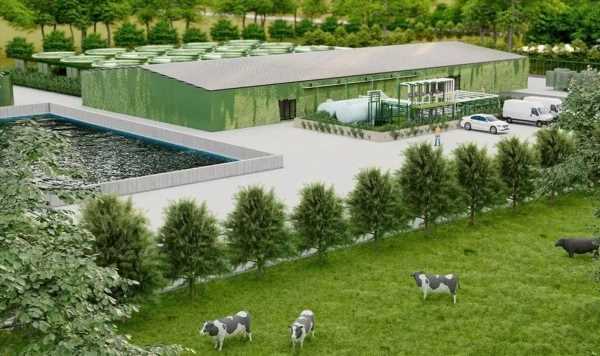
Green Britain: Geologist explains how geothermal site works
We use your sign-up to provide content in ways you’ve consented to and to improve our understanding of you. This may include adverts from us and 3rd parties based on our understanding. You can unsubscribe at any time. More info
A controversial new geothermal plant has been granted in Cornwall despite local concerns over its impact on the landscape. According to Geothermal Engineering Limited (GEL), which has been given the green light for its plan to harness the heat generated within the Earth, its site could produce enough green energy to power thousands of homes. Despite some local opposition to the site, Cornwall Council’s strategic planning committee granted planning permission for two deep wells and a power plant at Lower Crahan Farm, in Wendron, near Helston.
However, locals slammed the energy company’s plan, arguing that it would spoil the landscape of the area, and destroy the countryside.
Wendron Parish Council objected to the plans saying that while they supported the introduction of geothermal energy they did not believe that it was the right location.
They said: “It is strongly believed that the proposed location is unsuitable down to its position in open countryside. It is strongly believed that this development will industrialise our countryside.”
The parish council also claimed “the amount of power produced will, in the scheme of things, be minimal” and that “it will not help local people”.


Geothermal Engineering Limited claimed its site could generate enough energy to power 9,000 households, equivalent to the whole population in Helston.
The company claimed it had listened to local concerns, and reduced the height and size of the power plant building, attempting to make it look more like a barn.
GEL also added as part of a wider plan to rollout geothermal energy projects in Cornwall, it had carried out extensive consultation and environmental studies on its plan.
Councillor Loveday Jenkin said she was torn between supporting renewable energy in the region and protecting area’s rural character. She said: “I understand both sides of this argument. It is a difficult decision.”


She said she understood the concerns of locals about the impact that the development could have on the area and concerns about “the urbanisation of the rural area”, Cornwall Live reports.
But she also saw the benefits of providing renewable energy and said that a geothermal plant had a much smaller footprint than solar farms. However, she was still uncertain whether it was the right location for such a development.
The Cornwall councillors agreed to a deal with the GEL, adding a condition that if the geothermal plant does hit an output of more than 5mw then the applicants would have to inform Cornwall Council and set up a 5 percent community ownership agreement.
Currently, geothermal power makes up a tiny portion of the renewable energy mix, with geothermal technologies accounting for just 0.3 percent of the UK’s annual heat demand according to some experts.
DON’T MISS:
Stinking insect dubbed ‘Hitler Bug’ after resemblance to Nazi dictator [REPORT]
Texas fireball that ‘shook houses’ was 1,000lb meteor, NASA confirms [INSIGHT]
British Gas customer forced to use funeral funds as firm makes billion [REVEAL]

However, MPs on the Environmental Audit Committee have been urging the Government to harness this untapped resource, noting that geothermal energy can potentially fulfil much of the UK’s current heating demands via a combination of heat pumps, district heating systems, and power generation.
It added that some projections predict that the sector could support as many as 25,000 jobs by 2050, and could play a key role in helping the UK to race to net zero by 2050.
But the committee warned: “The Government has been slow to exploit the potential of geothermal, and has not integrated it fully into the net zero strategy: this appears to be holding back a sector which could be transformative for the UK’s capacity to meet climate goals, use homegrown energy and grow the economy.”
Cornwall has been pinpointed as one of the prime locations where geothermal technologies could be rolled out to as it has “hot rocks” granite that is close to the surface. The Eden Project, for instance, is already investing in geothermal technology.
Source: Read Full Article